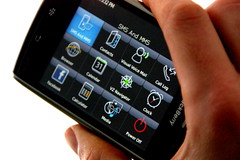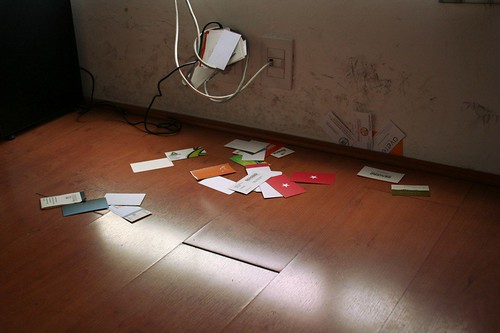Plenty of blogs have already been written on the subject, and by plenty, I mean plenty! A google search for 'iphone v storm' returns 241,000 search results in 0.26 seconds. [is it wrong that all my postings thus far have pretty much started with some reference to googling my subject prior to writing?] Established technology sites such as Mac World, PC Advisor, Business Week and CNET to name but a few have already had their say. In addition blogs such as Blogging Stocks, CNN's fortune blog, The iPhone Blog and Agile UI have their own take on the subject. There's also been a review in the Daily Mail!

Whilst valid sources of information it does strike me as a bit one dimensional to focus any research purely on the electronic written media ("market research = googling" is probably a post for another day!). To gain a wider perspective, other factors should really be introduced. For example, questions such as 'Why are we comparing the two devices?', 'How does that comparison take place?' (comparing stats or how it's used in different situations), 'Are we comparing expert opinion or should we actually talk to end users about their experiences?' would at least strive to add extra dimensions to the conundrum: which device is better? Even writing that question, a million others leap out demanding to be heard! 'Better for what?', Better for who?', 'Better Why?'. OK a million is probably over egging things slightly, but the point remains valid.
Both devices are so similar in concept yet vastly differing in execution that comparisons seem almost an obvious medium for assessment. However to try an ascertain 'the better device' seems almost Utopian in concept when no definition of purpose has been made. A lot of the reviews listed above suffer in this way and as a result give no ultimate verdict. Others do give some conclusions but contain caveats (if you're after remote Bluetooth profile restriction or camera disabling, chose the Storm says PC Advisor to CNN's advice that if you want the Safari browser, chose the iPhone!).
I'm willing to admit that a direct comparison is probably demand-led rather than a desired medium to review these products, and that the audiences for the more established technological publications probably don't have the time to read reviews based on given criteria but I am going to pursue with this tac. Until the Storm, RIM were practically grounded in the corporate market, and Apple the consumer, so it's probably only natural to wonder to what extent each product will cross-over to the other's marketplace. However 'which product gains ground on the other's market position' doesn't really address which product is most suitable to a given scenario.

As an example, and in an attempt to provide the wider context mentioned above, the CIO of my American parent company's experiences with the iPhone provide a good insight. He was over in the UK in January this year with. Of the 3 days here was here, I don't recall him having any positive experiences with his device to share. He failed to overcome the network restriction issues to get access to a network (taking out all but WiFi communications); so no email, calls, calendar sync that are the lifeblood of remote working on these devices. He also complained about the battery. Despite not being able to use his device at all it still required charging every day. In the past he's been over with his blackberry and once or twice encountered problems with network connections that he has resolved whilst still in the UK, but apart from that he's encountered no problems.
It seems clear from his experience, and especially when foreign travel is involved, that the iPhone wasn't really a suitable device for him. Another blogger has had a similar experience when over from the US. It doesn't really matter about Internet surfing, remote bluetooth configuration and the user experience from an aesthetic viewpoint when the device will not work as required. This functionality only enhances if the fundamentals have been met. The point regarding the battery is also key. Regardless of preference for almost any other aspect, if you are a heavy user you need at best a strong battery and at least an exchangeable one. It's hard to imagine why you'd persevere with an inferior battery that you can not exchange if you are a heavy user.
To balance that experience, and sticking with the iPhone for a moment, I must admit my phone is very much fit for purpose. It is a personal device and configured as such, but through the Google Sync application I can control my work and personal calendars on the one device. I can configure my work and personal email accounts (although for battery reasons I don't enable the push feature) and apart from the odd query over who pays for the phone call there isn't really an issue. But then again I'm not a heavy user. One blogger commented that he'd sent less email since using the iPhone because it was not as simple an experience as the Storm. Is that such a problem? I prefer the iPhone to the Storm (only test driven the Storm in fairness, but plenty of blackberry experience) because it gives a better user experience, I like the App Store and it meets my lighter business needs; I believe in quality not quantity when it comes to communicating away from the office.
For me I've come to view smart phones as an inconvenience. Having one, and more importantly colleagues knowing you have one, creates the assumption that you are immediately contactable, can give your undivided attention and are willing to communicate back! I've over heard conversations ending with 'yes she's on holiday but she's got her blackberry so just drop an email, I'm sure she'll reply'! Taken in cold isolation it's ridiculous! In addition to ensuring your actual requirements for such a device has been established prior to engaging in some form of evaluation, I believe it is important to set your expectations as to the use of such a device. That sounds corporate and soundbite-ish but is it not routed in common sense?
There is another interesting comparison on the Blogging Stocks post that fits better with my view. They've concentrated their comparison on the user satisfaction aspect.
It's probably not coincidental that their focus is not entirely technology-driven and as such in my view gives a more balanced view. Again it does not suggest one product is inferior based on its finding, more that the storm can take more getting used to.
It's important I think to note that I'm not knocking traditional product reviews. I get excited as the next person [OK geek!] when I read a review that has good quality pictures of the product and detailed technical specifications. I just believe in this instance that is not a sufficient form to compare these two devices.














